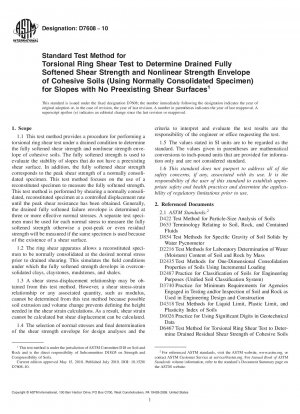ASTM D7608-10
Standard Test Method for Torsional Ring Shear Test to Determine Drained Fully Softened Shear Strength and Nonlinear Strength Envelope of Cohesive Soils (Using Normally Consolidated Specimen) for Slopes with No Preexisting Shear Surfaces
- Standard No.
- ASTM D7608-10
- Release Date
- 2010
- Published By
- American Society for Testing and Materials (ASTM)
- Status
- Replace By
- ASTM D7608-18
- Latest
- ASTM D7608-18e1
- Scope
The ring shear apparatus maintains the cross-sectional area of the shear surface constant during shear and shears the specimen continuously in one rotational direction for any magnitude of displacement and along entire cross-sectional area.
The ring shear apparatus allows a reconstituted specimen to be consolidated at the desired normal stress prior to drained shearing. This simulates the field conditions under which the fully softened strength develops in overconsolidated clays, claystones, mudstones, and shales because the fully softened strength corresponds to the peak shear strength of a normally consolidated clay.
The ring shear test is suited to the relatively rapid determination of drained fully softened shear strength because of the short drainage path through the thin specimen and failure occurring near the top porous stone.
The ring shear test minimizes the effect of initial disturbance that may result from adjusting/creating a gap before starting shearing, especially in the direct shear device.
The test results are primarily applicable to assess the shear strength of overconsolidated soils for drained analysis in slopes that do not have a pre-existing shear surface, sheared bedding planes, joints, or faults.
Note 18212;Notwithstanding the statements on precision and bias contained in this test method: The precision of this test method is dependent on the competence of the personnel performing it and the suitability of the equipment and facilities used. Agencies that meet the criteria of Practice D3740 are generally considered capable of competent testing. Users of this test method are cautioned that compliance with Practice D3740 does not ensure reliable testing. Reliable testing depends on several factors; Practice D3740 provides a means of evaluating some of those factors.
1.1 This test method provides a procedure for performing a torsional ring shear test under a drained condition to determine the fully softened shear strength and nonlinear strength envelope of cohesive soils. The fully softened strength is used to evaluate the stability of slopes that do not have a preexisting shear surface. In addition, the fully softened shear strength corresponds to the peak shear strength of a normally consolidated specimen. This test method focuses on the use of a reconstituted specimen to measure the fully softened strength. This test method is performed by shearing a normally consolidated, reconstituted specimen at a controlled displacement rate until the peak shear resistance has been obtained. Generally, the drained fully softened failure envelope is determined at three or more effective normal stresses. A separate test specimen must be used for each normal stress to measure the fully softened strength otherwise a post-peak or even residual strength will be measured if the same specimen is used because of the existence of a shear surface.
1.2 The ring shear apparatus allows a reconstituted specimen to be normally consolidated at the desired normal stress prior to drained shearing. This simulates the field conditions under which the fully softened strength develops in overconsolidated clays, claystones, mudstones, and shales.
1.3 A shear stress-displacement relationship may be obtained from this test method. However, a shear stress-strain relationship or any associated quantity, such as modulus, cannot be determined from this test method because possible soil extrusion and volume change prevents defining the height needed in the shear strain calculations. As a result, shear strain cannot be calculated but s......
ASTM D7608-10 Referenced Document
- ASTM D2216 Standard Test Method for Laboratory Determination of Water (Moisture) Content of Soil and Rock by Mass
- ASTM D2435 Standard Test Method for One-Dimensional Consolidation Properties of Soils
- ASTM D2487 Standard Test Method for Classification Of Soils For Engineering Purposes
- ASTM D3740 Standard Practice for Minimum Requirements for Agencies Engaged in the Testing and/or Inspection of Soil and Rock as Used in Engineering Design and Construction
- ASTM D422 Standard Test Method for Particle-Size Analysis of Soils
- ASTM D4318 Standard Test Methods for Liquid Limit, Plastic Limit, and Plasticity Index of Soils
- ASTM D6026 Standard Practice for Using Significant Digits in Geotechnical Data
- ASTM D6467 Standard Test Method for Torsional Ring Shear Test to Determine Drained Residual Shear Strength of Cohesive Soils
- ASTM D653 Standard Terminology Relating to Soil, Rock, and Contained Fluids
- ASTM D854 Standard Test Methods for Specific Gravity of Soil Solids by the Water Displacement Method
ASTM D7608-10 history
- 2018 ASTM D7608-18e1 Standard Test Method for Torsional Ring Shear Test to Measure Drained Fully Softened Shear Strength and Stress Dependent Strength Envelope of Fine-Grained Soils
- 2018 ASTM D7608-18 Standard Test Method for Torsional Ring Shear Test to Measure Drained Fully Softened Shear Strength and Stress Dependent Strength Envelope of Fine-Grained Soils
- 2010 ASTM D7608-10 Standard Test Method for Torsional Ring Shear Test to Determine Drained Fully Softened Shear Strength and Nonlinear Strength Envelope of Cohesive Soils (Using Normally Consolidated Specimen) for Slopes with No Preexisting Shear Surfaces
